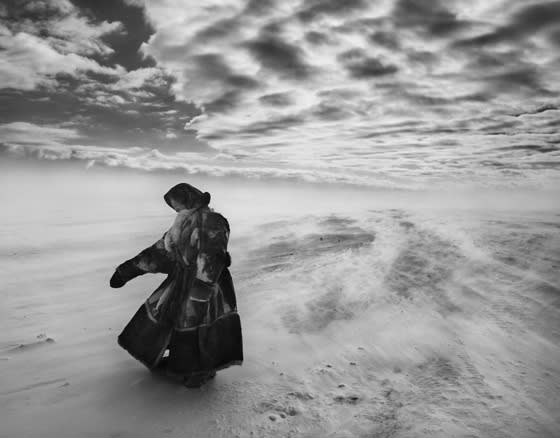A fascinating black and white odyssey through the career of one of the most acclaimed image-makers of our time, The Salt of the Earth is a moving if slightly hagiographic tribute to 71-year-old Brazilian artist Sebastião Salgado. Codirected by Cannes darling Wim Wenders and Salgado's own son, this singular biographical survey charts how a self-taught talent with a PhD in economics spent four-plus decades documenting major historical events without falling into the trap of disaster photojournalism.
Speaking in French to an off-camera Wenders, Salgado spends the first chunk of the film reflecting on his life's two parallel journeys: first, the globe-trotting photographic travels during which he embedded himself with his subjects for prolonged time periods, whether in the drought-stricken Sahel region of Africa or in remote Arctic islands. Then, the personal toll these famines, exoduses, genocides and war-related atrocities took on the man, describing the experience as "having seen into the heart of darkness."
Although this amounts to a pretty straightforward profile, it works chiefly because Salgado is an articulate storyteller full of compelling insights that enhance and deepen our understanding of his photographic undertakings. You can't help but appreciate his boundless empathy for subjects, as well as his ability to tread a fine line between art and documentary in bearing witness to historical events. Salgado also opens up to Wenders about how his leftist upbringing and raising a child with Down syndrome shaped his understanding of photography as a political tool.
In parallel to these Wenders interviews, Salgado's son travels with his father on assignments related to his "Genesis" project, which find him reconnecting with the natural world via awe-inspiring environmental and landscape photography. Here, The Salt of the Earth touches on some of its most revealing material: the strained relationship between father and son that stems from Sebastião's near absence during Juliano's childhood, and their recent attempts at making up for lost time. This adds a great deal of perspective to a snapshot of the man few would argue has had far-reaching influence on contemporary photojournalism, but whose own family turmoil hints at some of the painful sacrifices he's had to make.
Disappointingly, Salgado isn't given the opportunity to defend his body of work against the longstanding criticism of folks like Susan Sontag, who argued that he fetishized human misery — indeed, it's never brought up. But you'll be quick to forgive the filmmaking duo, as their bias is never less than crystal clear: celebrating a restless traveler and his unique ability to capture the beauty and nobility along with the despair.
(Mongrel Media)Speaking in French to an off-camera Wenders, Salgado spends the first chunk of the film reflecting on his life's two parallel journeys: first, the globe-trotting photographic travels during which he embedded himself with his subjects for prolonged time periods, whether in the drought-stricken Sahel region of Africa or in remote Arctic islands. Then, the personal toll these famines, exoduses, genocides and war-related atrocities took on the man, describing the experience as "having seen into the heart of darkness."
Although this amounts to a pretty straightforward profile, it works chiefly because Salgado is an articulate storyteller full of compelling insights that enhance and deepen our understanding of his photographic undertakings. You can't help but appreciate his boundless empathy for subjects, as well as his ability to tread a fine line between art and documentary in bearing witness to historical events. Salgado also opens up to Wenders about how his leftist upbringing and raising a child with Down syndrome shaped his understanding of photography as a political tool.
In parallel to these Wenders interviews, Salgado's son travels with his father on assignments related to his "Genesis" project, which find him reconnecting with the natural world via awe-inspiring environmental and landscape photography. Here, The Salt of the Earth touches on some of its most revealing material: the strained relationship between father and son that stems from Sebastião's near absence during Juliano's childhood, and their recent attempts at making up for lost time. This adds a great deal of perspective to a snapshot of the man few would argue has had far-reaching influence on contemporary photojournalism, but whose own family turmoil hints at some of the painful sacrifices he's had to make.
Disappointingly, Salgado isn't given the opportunity to defend his body of work against the longstanding criticism of folks like Susan Sontag, who argued that he fetishized human misery — indeed, it's never brought up. But you'll be quick to forgive the filmmaking duo, as their bias is never less than crystal clear: celebrating a restless traveler and his unique ability to capture the beauty and nobility along with the despair.




